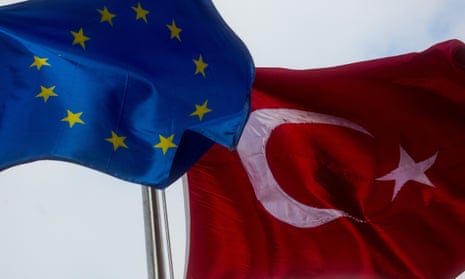Turkey’s president has threatened to tear up a landmark deal to stem the flow of refugees into Europe a day after the European parliament urged governments to freeze EU accession talks with Ankara.
The threat underlines how far relations between Turkey and the European bloc have deteriorated in recent months, particularly after a coup attempt in July.
“You clamoured when 50,000 refugees came to Kapikule, and started wondering what would happen if the border gates were opened,” Erdogan said in a speech on Friday at a women’s rights conference, referring to a Bulgarian border checkpoint where refugees massed last year.
“If you go any further, these border gates will be opened. Neither I nor my people will be affected by these empty threats,” he said. “Do not forget, the west needs Turkey.”
Erdoğan’s statements, the most direct warning yet that Turkey could abandon the agreement, came in response to a symbolic, non-binding vote in the European parliament on Thursday that demanded an end to the decade-long accession negotiations.
Turkish officials said the vote was meaningless but that it raised questions about the entire partnership between their country and the European bloc. Germany, France and most other EU states back continued engagement.
The EU and Turkey negotiated a deal in March of this year that halted the influx of refugees, particularly from Syria, into Europe in exchange for economic aid and a promise to grant visa-free travel to Turkish citizens within the Schengen zone. The latter clause has not been fulfilled.
But relations collapsed after a failed coup attempt in July. Turkish officials say Europe has failed to show sufficient support in the aftermath of the putsch, and bristle instead at the repeated criticism of a purge of tens of thousands of civil servants, army officers and policemen accused of links to Fethullah Gülen, a US-based preacher whose movement is widely believed in Turkey to have orchestrated the coup plot. He denies the allegations.
Brussels has also repeatedly criticised a crackdown in recent weeks on media outlets and Kurdish politicians, saying the campaign raised questions about Turkey’s commitment to EU values. The European parliament’s outgoing president, Martin Schulz, suggested EU leaders could opt for imposing economic sanctions on Turkey.
The furore led to growing talk of a “Trexit” – Erdoğan earlier this month suggested his country could hold a national referendum on whether to continue accession talks by the end of the year or early next year.
It was a major turnaround from the early days of the Justice and Development party that Erdoğan founded more than a decade ago, for whom membership of the bloc was once a central tenet of its appeal and campaign.
Speaking at Chatham House, the Turkish deputy prime minister Numan Kurtulmuş denied Turkey was on the brink of abandoning its ties with the West. “We keep being asked, is Turkey changing [geopolitical] axis?” he said “No. There is only Turkey’s axis of its national interest”
In Berlin a spokeswoman for the German foreign ministry said the EU should not freeze negotiations. “It is important that we keep talking,” said Sawsan Chebli. “It is important that we do not freeze the accession negotiations because that would only further damage the relationship between Turkey and Europe, and that would not be in the interest of Turkey or of Europe,” she added.
The European parliament’s vote does not bind EU foreign ministers, who will meet in December to discuss EU relations with Turkey.
Only Austria’s chancellor has called for an end to the “fiction” of EU accession talks, while France, Germany and the UK argue that keeping the long-running EU accession process going is the best way to ensure dialogue.
“The majority of delegations, except Austria, think the priority is to keep channels open,” a senior EU diplomat said. “The negotiations are not going especially fast,” he said, diplomatic understatement for the fact that in 11 years of talks, Turkey has only closed one of 35 “chapters” needed join the EU.
“We do not want to provoke a rupture or a break in our relations,” the diplomat said, but added that if Turkey voted for the death penalty Europe would have no choice, but to break off talks.
A spokesman at the European commission said: “We are sticking to the EU-Turkey agreement on refugees and we will do everything we can to make it succeed.” ends
Turkey’s president has previously threatened to put migrants on buses to Europe, but did not block a migration pact with the EU being signed in March. Turkish diplomats in Brussels have consistently played down the chances of Erdoğan tearing up the refugee deal, or Turkey’s parliament voting for the death penalty.
Turkey this week became the chair of the Energy Club of Shanghai Cooperation Organisation, and Erdoğan has said he could see membership of the organisation as an alternative to the European Union. The SCO was established by China and Russia in 2001 as an explicit military economic alternative to the EU, and Turkey already has dialogue status with the club. It is the first time a non-full member has become chairman of a club organisation.
Kurtulmuş insisted Turkey was an island of stability in a region of chaos, repeatedly highlighting the cost and commitments made by Turkey to help Syrian refugees.
He promised the fight against the coup plotters would continue for some time, describing them as an organised crime network
He also insisted Europe had yet to understand the actions of the government after the coup, and Nato partners had not shown the necessary willingness to understand the scale of the threat posed to stability by Gülenists and Kurdish terrorists.
